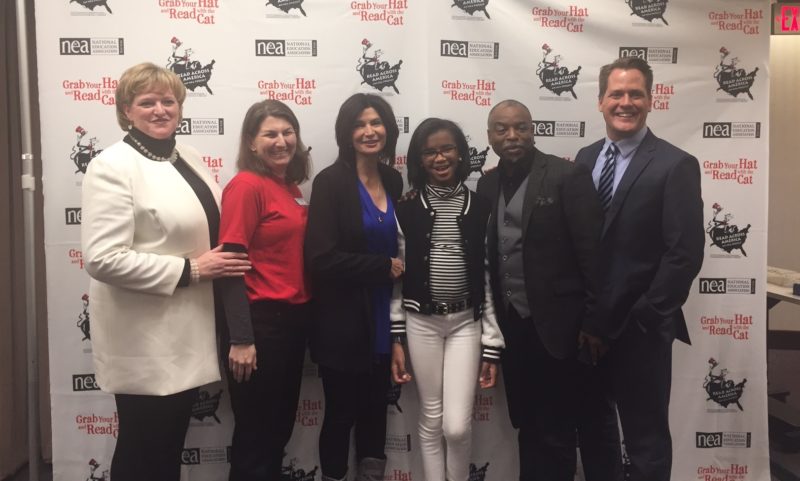 From Left: Reading is Fundamental President Alicia Levi, NEA Read Across America Chair and Alabama media specialist Ashley Strickland, NEA President Lily Eskelsen García, student and diverse books advocate Marley Dias, Reading Rainbow’s LeVar Burton, and First Book Chief Operating Officer Chandler Arnold.
From Left: Reading is Fundamental President Alicia Levi, NEA Read Across America Chair and Alabama media specialist Ashley Strickland, NEA President Lily Eskelsen García, student and diverse books advocate Marley Dias, Reading Rainbow’s LeVar Burton, and First Book Chief Operating Officer Chandler Arnold.
The joy of reading and the power of books to inspire, excite and transport is what Read Across America Day celebrates and it’s what a panel of literacy experts talked about at “Literacy in America,” a roundtable discussion hosted by NEA as part of its Read Across America celebrations.
Marley Dias, a 12-year-old book lover who is on a mission to collect books about girls of color through her campaign #1000BlackGirlBooks, LeVar Burton, who hosts the long-running PBS children's series “Reading Rainbow,” portrayed Lt. Commander Geordi La Forge in “Star Trek: The Next Generation” and starred as the young Kunta Kinte in the 1977 award-winning miniseries “Roots,” joined NEA President Eskelsen García, Reading is Fundamental (RIF) President Alicia Levi, First Book Chief Operating Officer Chandler Arnold and Alabama media specialist and NEA Read Across America Chair Ashley Strickland to talk about literacy and the need for more diverse books to reach underrepresented students.
“It’s critical that we see ourselves represented in the popular culture. Otherwise, it’s difficult if not impossible to develop a healthy self-image. These books are giving children of color an idea that they belong in the world and that the world belongs to them” - Levar Burton, host of "Reading Rainbow"
Eskelsen García kicked off the panel by sharing stories she’d heard over the years from NEA members about the importance of having the time and space every day to read out loud to their students and for older students to have time to read themselves during the day.
“We need to let them come in after recess and cool down with some Charolotte’s Web,” she said. “We’re not going to let that go.”
She then asked Marly Dias to share why she, at the “ripe old age of 10,” launched #1000BlackGirlBooks.
“I told my mom that I didn’t like having to read about white boys and their dogs all the time,” Dias said. “I enjoyed those books. But I was having a more diverse experience. For all I know I was the only one having that experience. That’s when I started looking for the books about black girls.”
She launched her campaign and when she reached 1,000, she took the books to schools in Jamaica, where her mother grew up.
“These stories about black people were not being shared with them though they were the majority,” Dias said. After that, the campaign took off and her book drive reached into the thousands. She’s now at 9,000 books about black girls that she donates to schools in Jamaica and around the U.S.
LeVar Burton applauded Dias for her work to bring diverse books to underrepresented kids.
“It’s critical that we see ourselves represented in the popular culture,” Burton said. “Otherwise, it’s difficult if not impossible to develop a healthy self-image. These books are giving children of color an idea that they belong in the world and that the world belongs to them.”
Arnold of First Book, which has donated 160 million books, many of them about diverse characters, to low income students around the country, spoke about the power of books to serve as mirrors and windows. His son is white and he said he wants him to fall in love with Newbery Honor Book Brown Girl Dreaming.
“Many kids in the inner city, where I teach, never leave their neighborhoods. The only way they can experience different lives and worlds is through the pages of the book” - Ashley Strickland, library media specialist
“We should see ourselves and see other people,” he said. “This is how we develop empathy and understanding.”
But we have a lot of work to do, he said, citing a study of the Cooperative Children’s Books Center which found that out of 100 books, 80 are about white protagonists, 8 are about African Americans, seven are about Asians, five are about Latinos, and one is about Native Americans.
“Publishers are doing all they can to find diverse books, but we need to change the narrative and do more to get these books into kids’ hands, to ignite their imaginations,” he said. “That’s what Read Across America is all about.”
Levi of Reading is Fundamental agreed, adding that it’s important to encourage more authors of color to share stories, and that publishers seek out more authors of color.
“We need to create more opportunities,” she said.
Library media specialist Strickland spoke about creating more opportunities for positions like hers in our schools. In Alabama, where she is from, the state funds a librarian position for every single public school. But many states cut the position when facing budget crises.
“It’s critical that we keep libraries staffed and operational,” Strickland said. “Many kids in the inner city, where I teach, never leave their neighborhoods. The only way they can experience different lives and worlds is through the pages of the book.”
Eskelsen García said that in the nation’s most affluent schools, there is always a librarian. With the passage of the Every Student Succeeds Act, there is an opportunity for all schools. from inner cities to rural communities, low and middle income, to fund a librarian position.
The law asks states to include success indicators – services and programs that help students succeed in addition to classroom academics -- to become standards in their public schools.
“We want that dashboard of opportunity indicators to include library media specialists,” she said.
For more highlights from the roundtable, visit our Facebook Live event.







